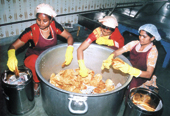 |
| Made with care : Women working in these kitchens take home at least Rs 2,000 a month (Photos: Prem Singh) |
Every day, at the crack of dawn, Bela Rani trudges the odd kilometre from her Vikas Nagar home to work. Several other women of Hastal, a dusty resettlement colony on the western fringes of Delhi, are on their way to work, too. Their paths converge at a brick-red building, standing incongruously amid a cluster of ill-planned brick-and-mortar constructions that dot this part of the city. Even as the first rays of the rising sun permeate through the haze that envelops the neighbourhood, the women have beaten their early-morning blues to get into the thick of action.
In the semi-automated kitchen that supplies mid-day meals to about 75,000 children in several schools run by the Municipal Corporation of Delhi (MCD), Bela Rani gathers puris coming out of an automatic puri-making machine, while Nirmala, her colleague, tends to the boiling potatoes. ?There?s chhole-puri being made today,? Bela Rani says with a smile. ?It?s a dish my children relish.?
Vaishali and Sahil Singh, Bela Rani?s children, study in Class V and Class IV in different MCD schools. Nirmala?s daughter, Jyoti, is enrolled in yet another school. Every day during recess, they eagerly await the lunch boxes that are delivered to their schools by vehicles operating from a kitchen like the one in which Bela Rani and Nirmala work. The women don?t quite know if the food they prepare actually reaches their own children. ?But some child in another school will probably eat it with equal delight,? the mother in Bela Rani reasons.
And Vaishali, Sahil and Jyoti may subsequently be feasting on food cooked in another kitchen by another caring mother. At present, four such kitchens in far-flung corners of the city, run by NGOs Indcare and Stree Shakti, collectively feed about three-and-a-half lakh of the 11 lakh schoolchildren enrolled in MCD schools.
It was following a Supreme Court order that the mid-day meal scheme was first started in MCD schools. While pre-processed food such as biscuits and chana daal were the norm in earlier days, the MCD soon began to give out contracts to caterers to supply meals instead of light snacks in schools.
The NGO-run kitchens employing mothers are the latest development. And the concept seems to have clicked. ?The women who work here are unskilled,? says Reeva Sood, executive director of Indcare. ?But since they are people who take charge of their individual households, they can all cook. And good culinary skills was the only pre-requisite we looked for while employing them in our kitchen,? she says.
The reason, explains Sood, is obvious. As mothers, each of the women would do their best to ensure that no schoolchild is disappointed over lunch. Kitchen supervisor Premkanta Gupta, affectionately called ?dadi? by her co-workers, agrees. ?It?s the care, love and responsibility with which the cooking is done that matters above everything else,? she says. Dadi?s children have all grown up, but she still cooks with the same fervour as she did in her younger days. ?It?s a grandmother?s instinct that keeps me engaged,? she says with a grin.
The kitchens have also provided the womenfolk among the resettled people in Delhi?s satellite clusters, like Hastsal, with a means of income. ?The women, who were previously unemployed, now take home Rs 2,000 every month. That?s a decent sum for their families to fall back on,? says Sood. ?And it?s this financial security for their families that brings the best out of the women at work.?
Given the meagre Rs 2 that the authorities sanction for a single mid-day meal, the kitchens have managed to work wonders so far. So if there?s vegetable pulao today, there?s puri-subzi tomorrow. Or rice and dal, chhole puri, or rajma rice, depending on the day of the week.
And though women hold fort in these kitchens, it?s not that men are not given a chance. ?My wife, Rani, is home looking after our three-and-a-half-year-old daughter,? says Roshan Lal. ?Since she cannot come to work, I have been given the chance.? Roshan currently does stock jobs such as washing utensils and peeling vegetables in the kitchen. Once jobless, he is glad he has been given the chance to keep his family going.
In trying to keep pace with their new job, the women have gone beyond conventions and tried their hands at things that were previously within the domain of men. Mansi, for example, has learnt driving and now sits behind the wheel of a Maruti van that carries food to schools. She also earns a whopping Rs 400 per day, far more than the others, and is successfully paying off the Rs 45,000 loan she had taken to buy the vehicle.
For the mothers and their families, it has been great going so far. ?But given the shallow resources, we wonder if we will be able to keep the project rolling for long enough,? says Sood. There are several lakh children, hoping that all goes well. After all, there is nothing quite like food the way Mummy makes it.










